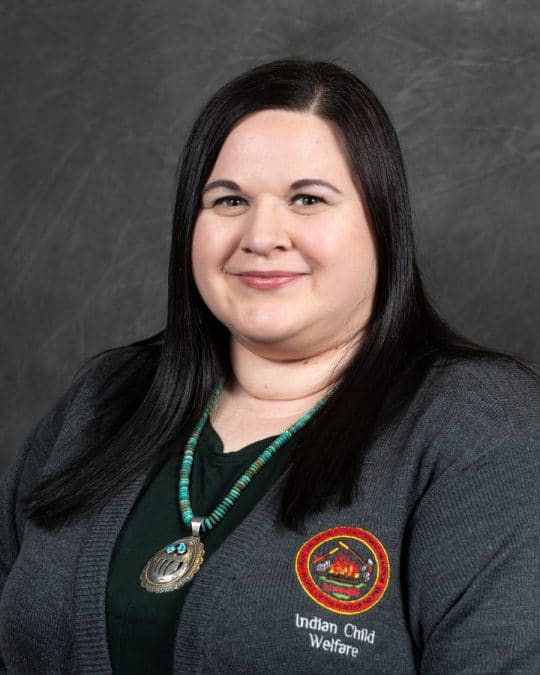AdoptUSKids’ Minority Professional Leadership Development Program recently accepted Citizen Potawatomi Nation employee Kendra Lowden into its 2020 class. Although the organization looks for minority professionals or those working with minority populations, Lowden is the first in the program’s history to be both an enrolled member of a federally recognized tribe and also an employee working for a tribal nation.
Lowden serves as the Citizen Potawatomi Nation FireLodge Children & Family Services foster care and adoption manager and celebrates her first anniversary in the department this March. Her position helps keep Citizen Potawatomi children safe and secure by working one-on-one with foster and adoptive families serving CPN children. She previously worked seven years at the Chickasaw Nation and two years with CPN’s House of Hope.

“The minority professional leadership development is geared toward minority child welfare professionals working in adoption, so it kind of fit me to a tee,” Lowden said. “The thing that interested me the most was that there would be a research project.”
The organization held a kick-off celebration and training in Washington D.C. at the end of January 2020, giving Lowden and FireLodge Director Ashlee May a chance to learn more about their field of work.
“I am just incredibly proud of her,” May said of Lowden. “She deserves this recognition. The things that she has done for Native American children in foster care and adoption world is just incredible.”
Process
To apply for the prestigious program, Lowden drafted an essay, completed phone interviews and put together a research proposal. Since beginning her career in Indian Child Welfare, she realized that many foster parents are not knowledgeable in Native American culture or law. Lowden applied to the MPLD program to help find solutions.
“Approximately one-third of the children in custody of the Oklahoma Department of Human Services are reported to be American Indian, making it extremely likely for foster parents to care for an American Indian child,” Lowden said.
Foster parents must attend DHS training before fostering children, but only a short portion of the instruction focuses on Native American culture or the Indian Child Welfare Act.
“The training has less than 10 minutes of the Indian Child Welfare Act included in it, and all that it says is the basis of the law: the placement preferences for Indian children,” Lowden said. “And in that time, it is combined with the multi-ethnic placement act, so it’s not even fully dedicated to the (ICWA).”
Her research includes determining the effectiveness of current DHS training measures and developing actions to improve them.
“If foster parents have limited training on the history and significance of the Indian Child Welfare Act, they are more likely to not understand the importance of tribal culture for children,” Lowden said. “They are also more likely to not understand the tenets of law, particularly why placement preferences provide for the long-term best interest of American Indian children.”
To collect data, she will survey non-Native families who are adopting or have adopted Native American children, asking whether the training was beneficial and if they feel equipped to meet their child’s cultural needs.
“My project is different from everyone else’s because all of them work for state or nonprofit agencies that work with the state, and they’re wanting to change implementation in their own agency. I’m wanting the largest agency in the state — DHS — to make changes to a curriculum that took them years to develop,” she explained.
Lowden will present her findings and solutions in Washington D.C. this fall, during which she is eager to address the foster system’s disproportionality of Native American children and close gaps. Although Native Americans make up only around 1 to 2 percent of the country’s total population, Native children account for more than 33 percent of all youth in Oklahoma DHS custody.
One way she hopes to increase foster family’s knowledge and understanding of Native culture is through incorporating new videos into DHS’s 27-hour foster training. But in the meantime, Lowden is integrating approaches at CPN to make an immediate impact in the lives of Citizen Potawatomi children and their families.
Potawatomi connections
Lowden and other FireLodge staff created packets to send to foster families that contains a book of Tribal services and programs, information about ICWA and cultural material including a traditional story about rabbit’s tail.
“We’re trying to reach out and make sure that we make those connections with the families and educate them on what a tribe is because a lot of them don’t know anything about tribes,” Lowden said. “They get this child that they’re told is Potawatomi, and they don’t know what to do.”
The kits serve as an opportunity to educate and introduce Potawatomi culture, no matter where they live.
“Many Potawatomi aren’t very connected or know much about their culture because they grew up away; so, my goal is to make sure that doesn’t keep happening,” she said.
Lowden looks forward to conducting further research for her project and finds her work in Indian Child Welfare gratifying.
“Being Native is a huge part of my identity,” she said. “To come here and to work with Potawatomi kids and to try and help them connect to their culture and their family, for me, it’s even more rewarding because that’s where I come from. I know the things I was lucky enough to grow up with. I would love for these kids to have the same.”
For more information about FireLodge Children & Family Services, call 405-878-4831 or visit potawatomi.org/firelodge.
